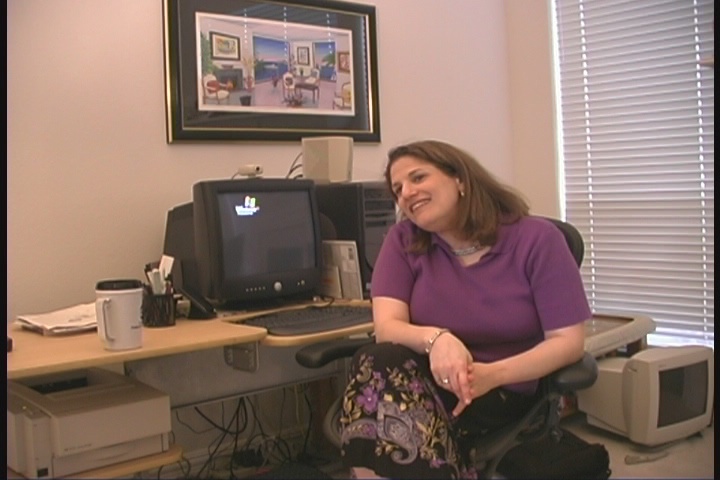Don't ask me how this happened, but I didn't realize Meryl was deaf
until an hour or two before the interview. I hadn't picked it up
in the letter she'd sent me to register, and it wasn't until I was
going over my notes before driving over that she mentioned her
husband would likely pick up the phone if I called. Not that it
ultimately matters; I just didn't know and I hadn't even thought
if I would conduct the interview differently.
I had to modify my interview method one slight way: I have a habit
of walking around taking pictures while questioning people (which
is probably pretty disconcerting to some) and in Meryl's case I
couldn't turn my head away from her and keep asking questions,
because she wouldn't be able to read my lips. I think I did it twice
anyway, just out of habit. As a result, there aren't many photos
of Meryl here, and they're all pretty much taken when the camera
wasn't rolling.
Meryl speaks to communicate, with the taught construction of sounds
formed even though she can't hear them. By a really, really strange
coincidence, I'd spent an hour the previous day listening to an NPR
story in which the main subject was a woman who was deaf and spoke
with the same taught construction of sounds. The story was fascinating
so I'd listened intently and had learned really quickly how to
understand the slight difference in syllables. As a result, even
though I'd had no idea that Meryl would speak this way, I'd had
an entire practice session the previous day! Now that's luck.
I asked Meryl if it was OK if I subtitle her answers, and she agreed.
When you subtitle someone speaking english with english, it could be
interpreted that you're saying the person doesn't speak english well
enough to be understood on their own. This is not the case with Meryl;
she's entirely understandable (a very clear speaker) but if you get
a sound bite of her she'll be off the screen before your ear adjusts.
Of course, there's an excellent chance we'll not even use subtitles
and just have her "straight". But I wanted to ask permission
beforehand.
Meryl also inspired me to guarantee, firmly and soundly, that this
documentary will have subtitles; Meryl's going to enjoy the thing as
much as everyone else, I promise.
We talked about the BBSes she ran, about the people she met through
them, and about her experiences online. I don't know why I have
a problem with this, but I find it creepy and wrong to focus on the
"unusual" aspect of a person who used a BBS. Sure, Meryl was both
female and deaf, which made her rather rare in the context of BBSes,
but to make every single question revolve around that aspect of her
would be limiting and foolish, in my opinion. So we covered the
experience of running her BBS, of having people help her set it up
and later crashing it, and of the difference between her BBS when it
was in Texas and the time she spent on the East Coast.
Also, her husband did an excellent job of keeping little youthful
hands from attacking my camera and lights, which they naturally
wanted to do. Kudos.
